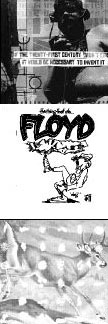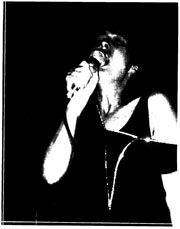Remember punk-rock compilation albums? All those great assemblages that got you up to speed on what you’d been missing before you bought your first leather jacket. Or—if you’re of an earlier vintage—those vinyl records that introduced you to a thriving scene halfway across the country?
So many compilations, so many bands on each one. Flex Your Head (Dischord, 1982) was the harDCore manifesto so explosive it was as if Minor Threat and Government Issue were trying to bust right through the cardboard sleeve. Remember anti-Reagan collections like Not So Quiet on the Western Front featuring the Dead Kennedys, 7 Seconds, and Fifth Column (Alternative Tentacles 1982)? And don’t forget local faves like Sub Pop 200, with Nirvana and Mudhoney (Sub Pop, 1988), and Kill Rock Stars (Kill Rock Stars, 1991), the disc that introduced the world to Bikini Kill.
Sharp, smart underground albums like these largely took a break in the 1990s, replaced by comparatively anemic budget sampler CDs. But a spate of worthwhile comps have hit the streets in recent months, including the double-disc Fields and Streams from Olympia’s Kill Rock Stars and the more challenging If the Twenty-First Century Didn’t Exist It Would Be Necessary to Invent It from KRS’ sister label 5 Rue Christine.
Those follow closely on the heels of a CD reissue of the pop-punk primer The Thing That Ate Floyd (Lookout!, 1988), last year’s arty Troubleman Mix-Tape (Troubleman Unlimited), and Calling All Kings & Queens from the feminist dyke label Mr. Lady.
In the ’80s, punk compilations were integral to spreading the word about searing underground rock. They were economical for both small labels, which often couldn’t afford to press a full record from each band on a comp, and for fans, who could hear a raft of new groups for the price of a single album.
But in a way, those comps led down a windy road to their own downfall. They exposed regional scenes, garnered fans, and helped bands develop their skills. Along with establishing a national touring circuit, they helped the indie world thrive— eventually attracting scouts from the majors.
As underground rock moved above ground, pressing compilations that would proselytize affordably became less imperative. Indie labels adopted more convenient tactics like issuing label samplers of mostly recycled tracks, such Epitaph’s Punk-O-Rama and Lookout!’s Freakout series. Today, kids make their own comps on hard drives for small circulation among their friends. (Meanwhile, mix albums have continued to thrive in other genres; just look at Funkmaster Flex’s hip-hop series and the Now That’s What I Call Music mainstream pop franchise).
Things started looking up for punk comps again round about the time Mr. Lady issued its first collection, The New Women’s Music Sampler (1999), with outspoken artists such as Tami Hart, the Need, and the Haggard. Calling All Kings & Queens upped the ante with unreleased tracks from Le Tigre (the warped and melancholy “Sweetie”) and Kiki & Herb’s camp, yet intense, take on Sleater-Kinney’s “I’m Not Waiting.”
Then, in late 2001, the double-disc Troubleman Mix-Tape—four years in the making—hit stores. The set shuffled the electro insanity of the Rah Bras’ “Fungry” with the punk shrieks of XBXRX’s “Cat.Garbage.Love” and All-Scars’ disorienting pastiche “Practice Dub.” In his liner notes to Troubleman Mix-Tape, label head Mike Simonetti looked back at all the comps that inspired him to launch is own record company—chief among them The Thing That Ate Floyd. Before Green Day had released their first record, Floyd documented for kids all over the country the thriving scene at Berkeley’s Gilman Street club and bands like Operation Ivy, Crimpshine, and Isocracy.
And now a round of “Yeeha!”s are due Kill Rock Stars for returning to the comp camp after several years in budget-sampler land. Dig the shit-hot-and-rockin’ contributors to Fields and Streams: Yeah Yeah Yeahs, Neko Case, Erase Errata, and the Mooney Suzuki. If you already dig those folks, then sidle up and get to know the ragtag rock of Coolies or the wigged-out funk of Beehive and the Barracudas.
More adventurous listeners might wanna experiment with If the Twenty-First Century. . . . You’re probably not gonna go for every track, but that’s par for the comp course. There’s plenty of sounds for all sorts of envelope pushers: the brain-skewering Sick Lipstick, the Prince-in-a-fever-dream Quintron, and the two-man tornado that is Hella.
That’s a lotta bands in a little space—with a potentially huge impact. After all, you never know what might inspire the next fledgling label to make its own mark in the comp department.









